Deciding what to eat for breakfast can be challenging. But skipping breakfast can deprive you of the energy you need for the day.
Your carbohydrate, protein, and fat ratios may vary depending on your diet and weight goals. Still, the nutrients in fruits, whole grains, yogurt, eggs, and nut butters can provide energy, satisfy your appetite, and set the stage for making informed decisions throughout the day.
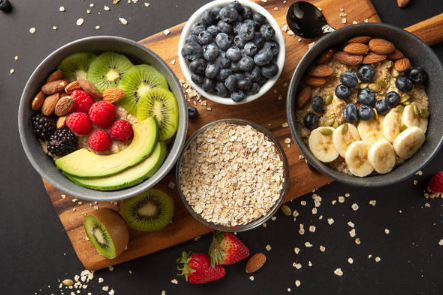
Luckily, you have plenty of delicious and easy-to-find options. Here are 19 healthy breakfast foods and tips from dietitians to improve them.
Nutrients to Eat for Breakfast
The National Institutes of Health (NIH) recommends consuming enough nutrients (carbohydrates, proteins, fats, vitamins, minerals, and water) to provide your body with the energy it needs each day.
Diet and nutritional needs vary by gender, age, weight, dietary preferences, culture, and budget. In general, any balanced meal, including breakfast, contains vegetables, fruits, whole grains, lean proteins, and low-fat dairy products. These foods provide you with nutrients to energize and satisfy your appetite at the beginning of the day.
The Department of Agriculture’s MyPlate tool can also help you create a healthy, balanced breakfast, including:
- Fill half of the plate with fruits and vegetables.
- Add the cereals to the quarter of the plate. Try to make whole grains from about half of your grains.
- Add lean protein to the last quarter of the plate.
- Also, add a glass of skim or low-fat milk or a non-dairy alternative.
If you’re not sure how much of each nutrient you need to eat to provide your body with proper energy, talk to your healthcare provider.
Why You Shouldn’t Skip Breakfast
The American Heart Association (AHA) recommends not skipping breakfast. In 2017, the American Heart Association reported that nearly two-thirds of people who skip breakfast are unable to meet their daily nutritional needs.
The American Heart Association states that people who skip breakfast are at high risk of the following health problems:
- Diabetes
- Heart disease
- High cholesterol
In particular, studies have found that skipping breakfast may increase the risk of overweight and obesity. Skipping meals can reduce calorie intake, but skipping breakfast may have a negative impact on the quality of your diet. This is because breakfast restores your energy, maintains blood sugar levels, and prevents overeating by satisfying your appetite.
It is especially important for children and adolescents to eat breakfast regularly. The fiber and nutrients in carbohydrates help improve concentration, and protein and low-fat dairy products can build muscle.
Read on for healthy breakfast ideas to add to your plate, including fruits, cereals, protein, and low-fat dairy products.
Drink
Coffee not only replenishes energy but also brings some benefits. If you’re not a coffee drinker, tea also has a lot of impressive benefits.
Coffee
Coffee can have a variety of benefits. Some evidence suggests a link between coffee consumption and a reduced risk of chronic diseases, such as:
- Certain cancers
- hepatopathy
- Parkinson’s disease
- Type 2 diabetes
Coffee also contains antioxidants and other compounds that help reduce inflammation and prevent disease. Caffeine is considered to be an ergot substance that helps boost energy production.

Tea
Studies have found that compounds in tea may reduce the risk of diseases such as diabetes and arthritis. Tea is also a rich source of immune-boosting antioxidants such as catechins, which can reduce cancer risk.
Fruit
Fruits contain many essential nutrients that the body needs, such as potassium, fiber, vitamin C, and folate.
The Department of Agriculture recommends adding half of the fruits and vegetables to your plate at every meal, including breakfast. Aim to eat two to three servings of fruit per day. One serving of fruit includes either a cup of whole fruit or a glass of 100% fruit juice.
Banana
The yellow fruit – especially when it still has a hint of green – is one of the best sources of resistant starch. Resistant starch is a healthy carbohydrate that resists digestion. Studies have found that resistant starch can improve postprandial blood sugar levels and increase feelings of fullness.
Cut it into thin slices and add to cereal or oatmeal. It will add a natural sweetness, so you may not need extra sugar.
Because they contain a healthy dose of potassium, bananas are a particularly good choice for people with high blood pressure. This is because potassium is an electrolyte that helps lower blood pressure naturally.
Blueberry
Fresh or frozen, these tiny superfruits are packed with antioxidants. According to a study published in 2014, eating blueberries regularly may improve brain function, including memory and motor skills.
Researchers have found that blueberries contain high concentrations of anthocyanins, which are powerful antioxidants. Anthocyanins help protect brain cells from damage and disease.
Hami Melon
Any fruit is a good addition to breakfast. Cantaloupe is no exception.
One cup of cantaloupe contains 11 mg of vitamin C and 232 mcg of vitamin A. Like most melons, cantaloupe has a high concentration of moisture (about 90 grams), which will keep you hydrated and full before lunch.
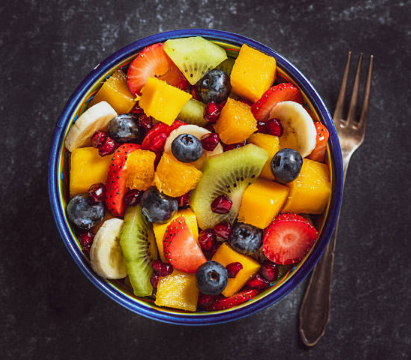
Cranberries
Cranberries contain vitamins, antioxidants, minerals, and fiber that aid digestion and support heart health.
Cranberries have a protective effect. Some evidence suggests a link between cranberries and a reduced risk of certain cancers. Cranberries may also help fight norovirus or other foodborne illnesses.
If you monitor the amount of sugar in your diet, cranberry juice (not cranberry juice cocktail) won’t contain as much sugar as other juices.
Grapefruit
Grapefruit is included in the list of healthy breakfasts because it contains vitamins C and A, potassium, and lycopene. Lycopene is an antioxidant that reduces the risk of stroke.
Grapefruit’s high fiber content doesn’t affect blood sugar levels because your body can’t digest it. This fruit is an excellent choice for diabetics who monitor their blood sugar levels.
For a full breakfast, pair it with protein, such as yogurt or eggs. Consult a healthcare provider if you take any medications, as grapefruit and its juice may interfere with some prescription medications.
Kiwi
This small, fluffy fruit contains about 134 mg of vitamin C per cup. Kiwifruit is rich in potassium and contains 5.4 grams of fiber. Potassium and fiber aid digestion.
Kiwi is a bit sour. They’re delicious, but if you like sweetness, try mixing them with strawberries and bananas in a smoothie or fruit salad.
Orange Juice
Freshly squeezed orange juice is a classic and delicious morning drink, but that doesn’t mean it can’t get healthier. Choose store-bought varieties rich in vitamin D for more nutritional benefits.
Like fatty fish and fortified milk, fortified orange juice is also a dietary source of vitamin D. One cup of fortified orange juice contains 100 international units (IU) of vitamin D, which helps reduce cancer cell growth and inflammation.
Keep in mind that orange juice isn’t the whole breakfast. You can pair it with a vegetable omelet or avocado toast to complete the meal. Orange juice contains vitamin C, which can increase the bioavailability of iron if you have iron deficiency anemia.
Raspberry
Raspberries contain ellagitannins, an antioxidant that may have cancer-fighting properties. Raspberries are also a great source of vitamin C.
You can buy fresh raspberries all year round. In the off-season, you’ll find them cheaper (with the same nutritional value) on the frozen food aisle.
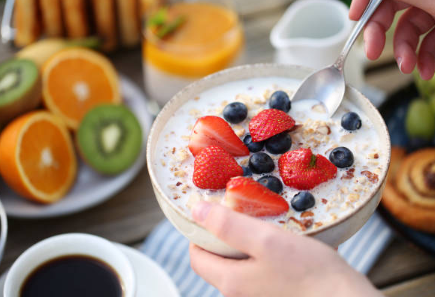
Raspberries are great to add to cereal or yogurt, or mixed into smoothies for a quick, ready-to-eat breakfast.
Strawberry
Berries are superfoods because they are high in antioxidants but high in calories. Strawberries, like blueberries, are a good source of anthocyanins.
One cup of strawberries contains 85 mg of vitamin C and 3 grams of fiber. Strawberries are also good for the heart. Studies have found that if people eat more than three servings of strawberries or blueberries per week, they are less likely to develop heart disease within 18 years.
Watermelon
As the name suggests, watermelon is an excellent way to hydrate in the morning. A slice of watermelon contains about 9.2 ounces of water.
This juicy fruit is also one of the best sources of lycopene, with an average of 9 to 13 mg of lycopene in 1.5 cups. Lycopene is a nutrient found in red fruits and vegetables that may protect against atherosclerosis, or hardening of the arteries. Atherosclerosis can lead to stroke, high blood pressure or heart disease.
Low-Fat Dairy Products
Nutrients like calcium, potassium, protein, and vitamin D in low-fat dairy products help build and support strong bones. As we age, these nutrients help reduce the risk of bone diseases such as osteoporosis.
For people who don’t consume dairy, plant-based milks and yogurts with added calcium, vitamin A, and vitamin D are great alternatives.
Egg
Once shunned due to their high dietary cholesterol content, eggs are now a healthy source of nutrients like protein and vitamin D. A large raw egg contains nutrients such as 6.3 grams of protein and 2 micrograms of vitamin D.
Although eggs contain cholesterol, some evidence suggests that eggs do not increase the risk of heart disease. A study published in 2018 found that people who ate eggs had an 11% lower risk of heart disease.
If, overall, you’re opting for lean protein instead of eating a lot of fat and cholesterol, then eggs are a good thing to have in your diet.
Greek Yogurt
This strong, creamy yogurt is rich in calcium. Greek yogurt is high in protein and can keep you feeling full all morning. Look for Greek yogurt with probiotics to promote gut health.
The best option: Choose plain, nonfat or low-fat varieties and add some fruit to give it sweetness and flavor (as well as a dose of additional nutrients). Add some chopped nuts or a tablespoon of nut butter for healthy fats.
Plant-Based Milk and Yogurt
Soy products are a great plant-based alternative because they have similar nutritional value to cow’s milk. Soy products contain protein, calcium, and vitamin D.
In contrast, the Ministry of Agriculture does not consider plant-based milk and yogurt (such as milk and yogurt made with oats, almonds and coconut) as part of the dairy category.
Look for the following nutrients in plant-based products:
- Calcium
- Dietary fiber
- Protein
- Vitamin B12
- Vitamin d
Try limiting your intake of plant-based products that are high in added sugars, saturated fats, and sodium.
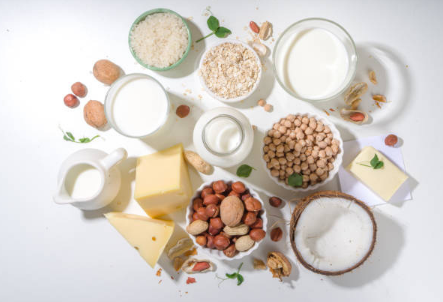
Nuts and Seeds
Nuts and seeds are a great source of protein when paired with other foods, especially if you don’t eat eggs or dairy. You’ll also find essential fiber, healthy fats, vitamins, and minerals in many nuts and seeds.
Almond Cream
Almond butter is an excellent alternative source of protein, with about 6.72 grams in two tablespoons. Almond butter contains monounsaturated fats and is a good substitute for saturated fats.
Flaxseed
Sprinkling ground flaxseeds into a smoothie or cereal will turn your breakfast into a rich source of omega-3 fatty acids, fiber, and lignans. These compounds have anti-inflammatory and antioxidant effects, which means they prevent cell damage.
Flaxseed can be an excellent addition to a diabetes meal plan because it’s rich in fiber, an important nutrient for blood sugar control.
Warning: Do not eat raw or unripe flaxseed, as it may contain toxic compounds.
Whole Grains
The Department of Agriculture recommends adding a quarter of grains to your dinner plate, about half of which are whole grains.
Whole grains contain many nutrients that are beneficial for health and help prevent some chronic diseases. For example, whole grains are a good source of fiber, which can help lower cholesterol levels. High total cholesterol is an important risk factor for heart disease.
Cereals
Grain foods can be tricky because there are so many types of grains. Foods that contain at least five grams of fiber and less than five grams of sugar may be your best bet.
You’ll find this winning combination in many whole wheat or bran grains, such as cracked wheat varieties. Whole grains contain fiber, B vitamins, iron, and other nutrients.
Add your favorite milk or non-dairy alternative to a bowl or mix with Greek yogurt or cottage cheese for more protein. Fruits can also be added for a nutritious meal. Fruit and whole grain fiber will help you feel full and satisfied. Fruits also contain antioxidants.
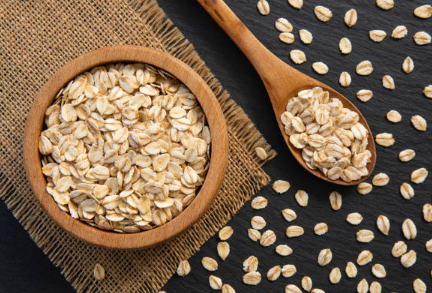
Rolled Oats
Oatmeal is a traditional breakfast option with many nutritional benefits. Oats contain β-glucan, a type of fiber that can help lower cholesterol when consumed regularly. Oats are also rich in phosphorus, magnesium, iron and zinc.
Oats can also:
- Boosts immunity
- Contains antioxidants that can reduce inflammation
- Supports digestive health
Overall, oatmeal is a healthy option. Choose plain rolled oats and sweeten them with fresh fruit, cinnamon, and nuts to reduce your intake of extra sugar.
Whole Wheat Bread
Carbohydrates are the backbone of breakfast. The type of carbohydrate you choose can have a big impact on the overall health of your meal. For example, if you want to add more fiber to your diet, choose whole-wheat bread or rye bread.
You can sprinkle eggs, avocado, or nut butter on the bread. The fats and proteins in these foods can help you feel more satisfied and fuller for longer.
Conclusion
You can eat a wide variety of breakfast staples that provide you with nutrients, staying power, and protein. Whether you eat eggs, oatmeal, or whole-grain cereal, these breakfast foods will get you off to a great start to your day.